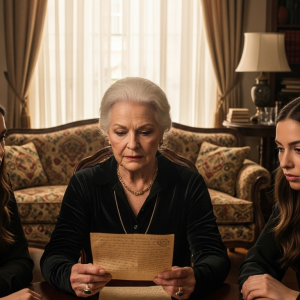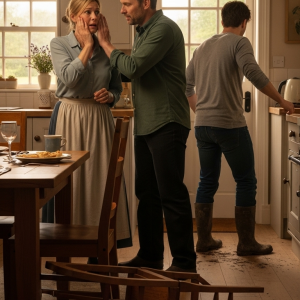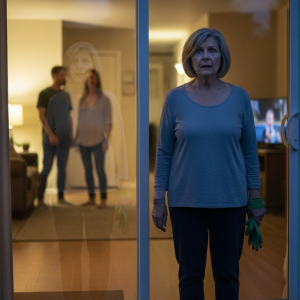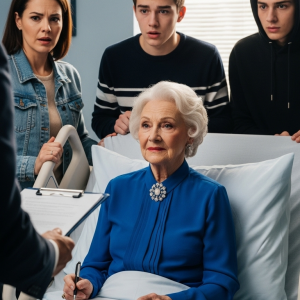Kayla called that Wednesday morning, her voice a practiced melody of sweetness. She and Brendan had a surprise, she said—a Mother’s Day train ride through the countryside. An old locomotive with vintage cabins, promising healing views of the cornfields outside Des Moines.
I hadn’t spent real time with them in months, just the polite orbits of holidays and birthdays. I’d grown used to the space between us. But this felt different. She used the word “healing,” and it hung in the air like a diagnosis I hadn’t agreed to.
Brendan didn’t call. He texted two words that night: Can’t wait. I packed a small bag, just in case, including the lavender scarf my husband gave me before he passed. Some part of me wanted to believe I was still a mother who was wanted.
They picked me up in Kayla’s car. She wore a yellow dress, a scarf tied at her neck like a flight attendant from a bygone era. Brendan was a silent passenger, his eyes glued to his phone. He looked tired.
The train station was a relic, smelling of old wood and distant rain. Only a few other passengers waited. Kayla handed me a thermos of chamomile tea. “We just need to check something with the ticket agent,” she said, kissing my cheek before walking away with Brendan.
I sat on the bench, watching the tracks shimmer in the sun, and I waited. Ten minutes stretched into twenty. I stood and walked to where they had disappeared. There was no one there. Only a small, folded note, taped beneath the bench.
If she still has her mind, she’ll find her way back.
The paper was too thin to carry the weight of those words. The train’s whistle blew, a mournful screech as it pulled away from the platform. Their car was gone. I was alone, with no phone, no purse—just a thermos of tea, my scarf, and a note that had just become proof.
I stood on that empty platform, the words settling in my chest like stones. I folded the note slowly, not with reverence, but with the cold precision of an archivist cataloging an artifact of betrayal. This was evidence.
The station was a small, lonely room with a blinking vending machine and a corkboard of faded flyers. The attendant was gone. There was no one to ask for help, no one to tell. My knees buzzed with the familiar hum of held-back emotion. I took a deep breath, not to calm down, but to anchor myself. I was not confused. I was not lost. I had been left.
Outside, the sun felt hollow. I followed the road out of the station, gravel turning to cracked sidewalk, sidewalk turning to dirt. I walked until the houses thinned and the landscape stretched wide and empty. Miles blurred into a haze of quiet resolve.
As the sun began to dip, my legs trembled with exhaustion. I stopped at a faded green gas station, leaning against the wall to catch my breath. A pickup truck pulled in, and a man in a flannel shirt stepped out. He moved slowly, his joints seemingly more memory than motion.
He nodded at me once, then went about his business. But as he walked past to go inside, he paused. I could feel his gaze—not pity, but a kind of quiet recognition. “You from around here?” he asked, his voice even.
I looked him in the eye. “I was left at the station.”
He nodded again. “I know the one. Used to work there before they cut the hours. You need a ride somewhere?”
I paused, then said, “Yes.” Not because I trusted him, but because I had no other choice. He opened the passenger door, and I climbed in. He didn’t ask questions, just started the engine, and for the first time since morning, I didn’t feel invisible. I wasn’t home, but I was no longer standing still.
The man’s name was Harold. He drove the back roads, lined with old fence posts leaning like tired men. He knew every bend and bump. There was a comfort in the silence between us, an unspoken understanding that words often just clutter the truth.
His house was modest, tucked behind a row of bare oak trees. He showed me to a recliner, brought me black coffee and a sandwich, and set up a cot in the spare room. He offered simple, unquestioning kindness. I lay awake that night, listening to the wind, piecing it all together. This was not a misunderstanding. This was a plan.
The next morning, Harold drove me home. As we pulled into my driveway, the house looked the same, but it felt alien. He handed me a folded note with his number. “If you ever need someone to remember what really happened,” he said, “I’m around.”
The front porch light was on, which was strange. Inside, the air hung with the chemical scent of a lemon cleaner I never used. My lavender diffuser was gone. My study, the one room I kept locked, had faint scratches near the keyhole.
I opened the drawer slowly. The documents were there, but the envelope labeled Property Deed had been moved. The seal was loosened, not broken. My heartbeat was oddly calm. I sat at my desk and opened my laptop.
I logged into my banking app. Security questions, two-step verification. And there it was. A new name listed under access permissions: Kayla M. Givens. Added three days ago. My finger hovered over the mouse. No money had been moved yet. It was just permission. A key to a door they had no right to open.
I closed the laptop and sat in my reading chair. The house was quiet, but it was no longer my home. I wasn’t just a mother they had left behind. I was a target. And now, I had to decide whether to be a victim or the author of what came next.
That night, I didn’t cry. I didn’t pace. I went to the hall closet, took down an old travel bag, and placed inside it a fresh notebook, a pen, and a burner phone I’d bought last fall after Kayla suggested I join their “family plan.” I zipped the bag and placed it under my bed. Tomorrow, I would begin.
I rose early and opened the new notebook. On the first page, I wrote the date, then began a list of simple, direct facts. Front porch light on. Drawer lock scratched. Bank account access granted to Kayla M. Givens. Each entry was a clean, unemotional brick in the wall I was building.
Brendan called that afternoon, his voice soft with a manufactured concern I now recognized. He said he’d drop by tomorrow to check in. When he arrived, he brought soup and sat awkwardly on the couch. “I’m glad you’re back safe, Mom,” he said, his eyes fixed on the floor.
Later that night, Kayla came, bringing warm banana bread and a smile that didn’t reach her eyes. She asked if I’d taken my vitamins. While I made tea, I watched her from the corner of my eye. Her gaze lingered on the hallway closet where I used to keep my travel documents.
In my notebook, I wrote: Brendan visit – avoided eye contact. Kayla visit – looked toward coat closet. I placed a tiny, clear sticker behind the front door trim. The next day, it was peeled back. Someone had tested the lock from the outside.
I had found my script. I was no longer the confused, aging mother they were trying to create. I was the director of this play, and they didn’t even know they were on my stage.
I found my old tape recorder in a dusty closet. I tested it with a fresh battery. The soft, mechanical hum was oddly comforting. I hid it beneath a folded towel in the guest room, the same room Kayla often used to “help me sort papers.”
I began my performance. I moved more slowly, letting my thoughts pause mid-sentence. I’d misplace my keys, then find them moments later. I left a note on the bathroom mirror reminding myself to turn off the stove. Kayla saw it and took a picture when she thought I wasn’t looking.
“You’ve been a little forgetful lately, haven’t you?” she said one day, her voice dripping with gentle concern. I just smiled faintly. “Have I?”
On Friday, I invited her for tea. She brought me a new planner and a pamphlet on support services for aging adults. I thanked her and excused myself to the kitchen, where the recorder was now hidden beneath the stove drawer.
Later, I listened back. I heard her voice, a quiet murmur to someone on the phone. “Brendan and I just want her to be safe. Once we file, it’s only temporary. We’ll keep it quiet.” File what? The word hung in the air. I copied the audio to a USB drive and hid it in a sewing tin she had given me for Christmas.
I reread my notes. A pattern emerged. Each visit, each feigned act of kindness was a calculated step. They were building a case against my mind. I was no longer just reacting. I was preparing my own.
Sunday afternoon, I invited Kayla for tea again. I placed the recorder under the cushion of the armchair she always chose. We made small talk until she steered the conversation back to my well-being.
“Brendan and I might help with managing your appointments soon,” she said, her eyes on her teacup. “There’s a process for that. We’ve already started filing for temporary guardianship. Just until things settle. It’s what’s best for you.”
My heart didn’t race. It slowed. I had been waiting for this. I nodded, pretending to dab my eyes with a tissue. She patted my hand, the gentle tyrant. After she left, I retrieved the recording. Her words were clear, calm, and damning.
That night, I called Martha Reed, a sharp-witted lawyer I knew from my yoga days. Her tone shifted from friendly to focused the moment I explained. “You have documents?” she asked. “And recordings?” “Good,” she said. “Do not confront them. We start with a freeze.”
The next day, I met Harold at a diner. He listened without interrupting, his expression unchanging. I handed him the USB drive, the notebook, and a sealed envelope containing my most recent will. He placed them in his coat pocket, poured more coffee, and talked about the weather. Two people moving pieces into place. For the first time in weeks, I slept through the night.
I met Martha at the senior legal center. She wore a blazer like armor, but her eyes were kind. I told her everything. She barely blinked, just wrote, underlined, and nodded. “Coercive elder abuse,” she said quietly. “It’s more common than you think.”
She showed me a form for a preemptive protective injunction. It wouldn’t accuse; it would simply freeze all movement on my assets and prevent anyone from gaining control until a court hearing. I signed it. “We’ll file this under seal,” she said. “They won’t know it exists until they try to act.”
Brendan called a few days later, his voice breezy. He mentioned Kayla had set up a meeting at the bank to “go over things.” I told him I trusted their judgment. “Good, Mom,” he said. “We just want to make sure everything’s in order.”
That weekend, I went to brunch with them, playing my part. I laughed at their stories. I asked about the garden. Later, I caught Kayla glancing into my office again. That was my cue. It was time to go.
The next morning, before the sun rose, Harold picked me up. I carried only one bag. We drove to a small, anonymous house his sister owned. It was clean, safe, and quiet. From there, I called Martha and gave her permission to file everything immediately. An unseen wall was now in place.
Kayla and Brendan walked into the bank with practiced confidence. They had an appointment, made in my name, to discuss “managing my affairs.” Their plan was to present a letter suggesting temporary guardianship, citing my supposed mental confusion.
What they didn’t know was that Martha’s certified letter had arrived three days earlier. It contained the court injunction and a formal notice: any attempt to alter or access my accounts without my physical presence was unlawful.
When Kayla asked the manager about the joint account, he met her with a firm, polite refusal. He tapped his screen. “I’m sorry,” he said, “but the account has been temporarily frozen due to a legal notice from the primary account holder.”
Kayla’s smile tightened. She pressed, hinting at my cognitive decline. The manager didn’t budge. “A court has issued protective measures,” he stated. “No changes can be made without her explicit, in-person consent.”
Brendan stood silent, his jaw clenched. Kayla’s voice rose, pulling out their prepared letter as if it were a royal decree. The manager simply shook his head. When she refused to leave, security was called. Their plan had shattered against a wall they never even saw.
Back at the small, quiet house, Martha’s text came through. They tried. The account is sealed tight. You’re safe. I didn’t smile. They hadn’t just tried to take my money. They had tried to take my voice. And now, they had been met with a silence more powerful than their own.
Before I left my old house for good, I slipped an envelope under the front door. Inside, I placed three things. The first was a transcript of the recording of Kayla’s voice discussing the guardianship.
The second was a letter. I wrote, The moment you decided I couldn’t make my own decisions, I made one. The third was a quote I’d underlined in a journal years ago: When they believe you’re weak, they forget you still remember.
There was no confrontation, only a sealed letter and my absence. I directed Martha to transfer my assets not back to me, but into a new foundation—a quiet fund for women over 60 needing help to reclaim control of their lives. I didn’t need revenge. I needed peace.
And peace came not with an apology I would never receive, but with the decision to stop waiting for one. If your silence has ever been mistaken for weakness, or if someone you love has tried to erase your power behind a smile, I hope this reminds you that dignity doesn’t always shout. Sometimes, it just quietly closes a door and never looks back.




